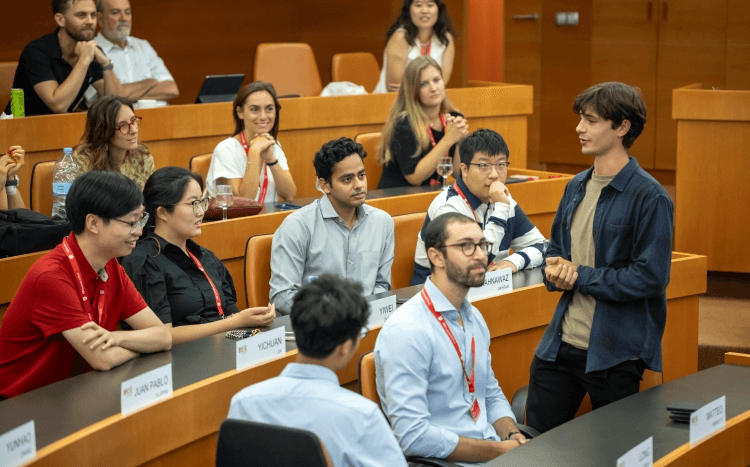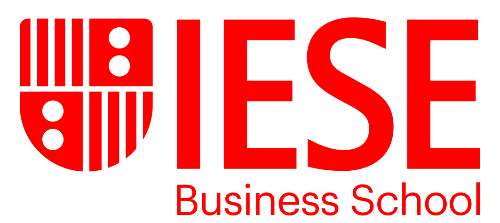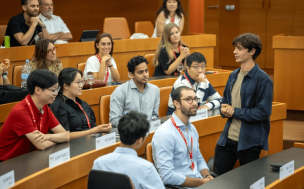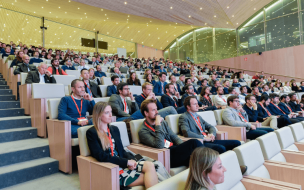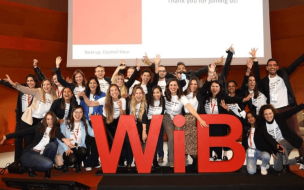Whether you have gained knowledge of the business world and management dynamics from your career or your bachelor's degree, you will be well positioned to take on cutting edge research in the realm of management.
Who knows, your research could just make it into renowned academic journals that have a real-world impact on the evolving business world.
Here are five reasons to study for a PhD in Management:
1. Immersion in a research topic of your choice
Studying for a PhD in Management will mean being able to deep dive into a topic that deeply interests you in an area of specialization such as finance, strategy, or operations. Perhaps there was something that has always played on your mind about the business world or a passion you’ve been itching to learn more about.
This was the case for Giacomo Marchesini, an Italian native who earned his PhD in Management from IESE Business School in Barcelona. He’s now an assistant professor in the department of strategy and innovation at Copenhagen Business School.
“I was searching for something more intellectually stimulating,” he says.
During his consulting career, he became interested in what drives innovation in firms.
His research now centers on behavioral decisions that drive the pursuit of novel medical treatments and in particular the role of prior failures (i.e. when drugs are not working) as catalysts for subsequent innovations.
“I’m looking into why you don’t just abandon a pharmaceutical drug even when it fails, or how the pressure of time or achieving results can impact success.”
Meanwhile, fellow IESE PhD in Management graduate Liudmila Alekseeva’s interest in the academic world began during her bachelor’s degree when she fell in love with the world of research and data collection methods.
Liudmila, who is originally from Russia, built on her experience working with startups and is now researching at the intersection between entrepreneurship and finance. In particular, she analyses the behavioral decisions behind why venture capitalists fund finance, considering aspects such as the gender finance gap.
"I've always been interested in VC decision-making from my experience of working with startups," she says.
2. Acquire top research skills
Strong research skills are integral to carrying out effective and influential research.
The IESE PhD in Management provides training on quantitative and qualitative research so that students can gain the relevant skills to conduct research at top academic levels. The program teaches students how to balance rigorous empirical strategies with qualitative insights that provide insight into business phenomena.
“Although I’m mostly involved in quantitative research, it’s been useful to learn both perspectives,” says Giacomo.
These research skills are important to set up students for future success as specialized academics. In fact, more than 90% of PhD students at IESE find careers at top educational institutions after graduation.
3. Grow your global network with a PhD in Management
A hidden secret of PhD life is the importance of networking. By connecting with likeminded people, you might discover insights that can enhance your research, form collaborations with other researchers, or just gain advice.
Liudmila worked on her research with experienced professors at IESE, which not only enhanced her research but helped her build strong professional relationships that can extend into her career in academia.
She now works as an assistant professor of entrepreneurship at KU Leuven in Belgium.
“I immediately liked the conversations I had with IESE professors during the initial interview process—I felt welcomed and supported,” she says.
The IESE PhD lasts four to five years so there’s plenty of opportunity for students to grow their network in this time. There are also opportunities for students to take a research term abroad, present at international conferences, and meet researchers from top business schools.
“You might not always be aware of all the research out there—the bigger network you have, the more you will find out,” says Giacomo.
4. Gain a fully funded scholarship
There’s no need to worry about the financial burden of a PhD in Management if you can find a program that’s fully funded.
Luckily, students are 100% funded when they are successful in their application to pursue a PhD in Management at IESE Business School.
This means you can dedicate yourself to your research and experience, without having to worry about funding your degree with a part-time job.
5. Study in a beautiful city during a PhD in Management
Going back to your studies also means benefiting from all the things about university that you loved—campus life, meeting new people, and exploring a new city.
IESE’s location in the cosmopolitan city of Barcelona certainly helped enhance Liudmila’s experience of PhD study.
“Living in Barcelona made the process more enjoyable as when you’re very busy and you go outside, you can enjoy the sun and beautiful architecture,” she says.
Giacomo comes from a small village in northern Italy so moving to vibrant Barcelona was an eye-opening experience for him.
“Although it’s a big city, it has a neighborhood environment feel to it,” he says.
Choosing to go back to academia is a decision you should think about carefully, but if delving deep into a topic is of interest to you or you want to move from the corporate world to the academic world, a PhD in Management could just be the right step.
“A PhD is a unique life experience—the opportunity to build relationships, network, learn new topics, and contribute to something impactful is what I have enjoyed the most,” concludes Liudmila.


